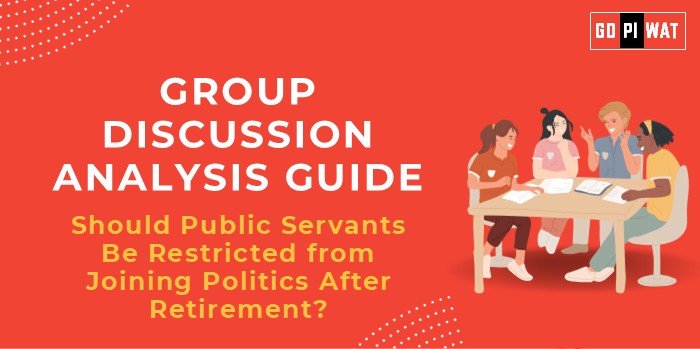📋 Updated Group Discussion (GD) Analysis Guide
🌐 Topic: Should Public Servants Be Restricted from Joining Politics After Retirement?
🌟 Introduction to the Topic
Opening Context: “The participation of retired public servants in politics raises critical questions about ethical governance and impartiality, with debates spanning fairness, democratic rights, and integrity.”
Background: The issue has become increasingly relevant as a significant number of Indian bureaucrats transition to politics post-retirement. Globally, cooling-off periods are a common practice to address such conflicts, with countries implementing durations ranging from less than a year to five years.
📊 Quick Facts and Key Statistics
- 🌍 Global Practices: 66% of countries implement cooling-off periods for public officials transitioning to politics or private roles, ranging from under a year to five years.
- 🇮🇳 Indian Precedent: A significant number of retired IAS and IPS officers have joined politics since 2010, highlighting a rising trend.
- ⏳ Cooling-Off Period in India: Currently limited enforcement of a one-year period for specific roles, with broader application lacking.
- 📊 Public Opinion: A substantial portion of citizens favor restrictions to ensure fair governance and maintain bureaucratic neutrality (IPSOS Survey, 2023).
🤝 Stakeholders and Their Roles
- Government: Frames and enforces regulations on post-retirement roles to maintain integrity.
- Public Servants: Balance career aspirations with ethical obligations.
- Political Parties: Gain experienced administrators but face ethical scrutiny.
- Citizens: Demand unbiased governance and transparent policymaking.
🏆 Achievements and Challenges
🎯 Achievements:
- Improved governance through experienced leadership.
- Enriched legislative processes by leveraging public service expertise.
⚠️ Challenges:
- Risks of insider information misuse for political benefits.
- Perceived erosion of trust in bureaucratic impartiality.
🌍 Global Comparisons:
- 🇺🇸 United States: Strict lobbying bans post-retirement to prevent conflict of interest.
- 🇸🇬 Singapore: Mandates disclosure and waiting periods for transitioning roles.
Case Study: The entry of senior officials into state politics in India has brought innovative policies but raised questions about biases and political motivations.
📚 Structured Arguments for Discussion
- Supporting Stance: “Cooling-off periods ensure retired public servants transition into politics without jeopardizing public trust or exploiting insider knowledge.”
- Opposing Stance: “Imposing restrictions on retired public servants’ political aspirations infringes on their democratic rights and deprives politics of experienced leadership.”
- Balanced Perspective: “A structured approach involving cooling-off periods and clear ethical guidelines can balance the value of expertise with the need for impartiality.”
💡 Effective Discussion Approaches
🚀 Opening Approaches:
- Highlight the global prevalence of cooling-off periods (66% of countries).
- Use specific examples of retired IAS officers influencing policy and governance.
- Mention recent public debates around ethical governance in politics.
🛠️ Counter-Argument Handling:
- “While restrictions may seem excessive, they are essential to maintain impartiality in governance.”
- “Instead of outright bans, transparency measures and controlled transition timelines can serve as effective alternatives.”
📈 Strategic Analysis of Strengths and Weaknesses
- Strengths: Ensures unbiased governance post-retirement; encourages long-term ethical behavior in civil services.
- Weaknesses: May deter talented individuals from contributing to politics; potential difficulty in enforcing uniform restrictions.
- Opportunities: Align regulations with international best practices; leverage retired officials’ expertise in advisory roles.
- Threats: Misuse of regulatory loopholes; potential for politicization of cooling-off policies.
🔗 Connecting with B-School Applications
- Real-World Applications: This topic connects with corporate governance analogies, ethical leadership frameworks, and conflict resolution strategies in management.
- Sample Interview Questions:
- “What lessons can corporate governance draw from the cooling-off periods in public service?”
- “How does ethical leadership influence public trust in governance?”
- Insights for B-School Students: Learn to implement ethical frameworks in leadership roles; adapt global governance strategies to organizational contexts.


